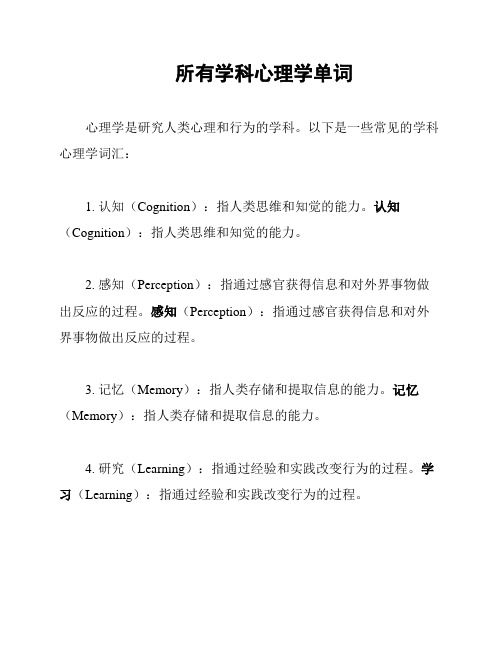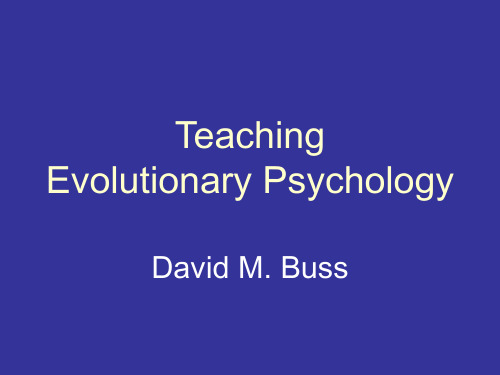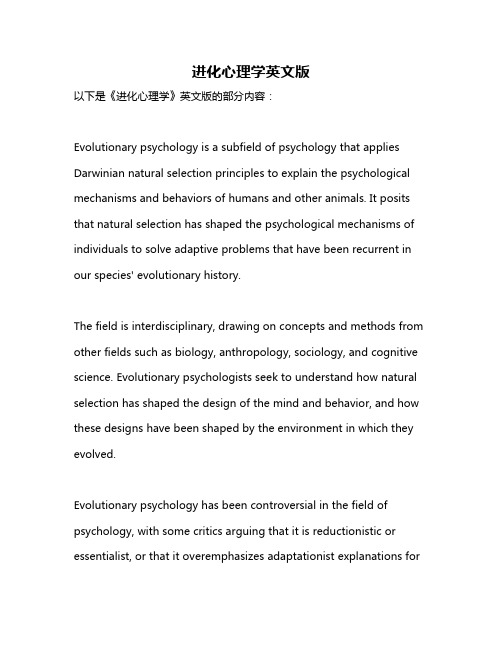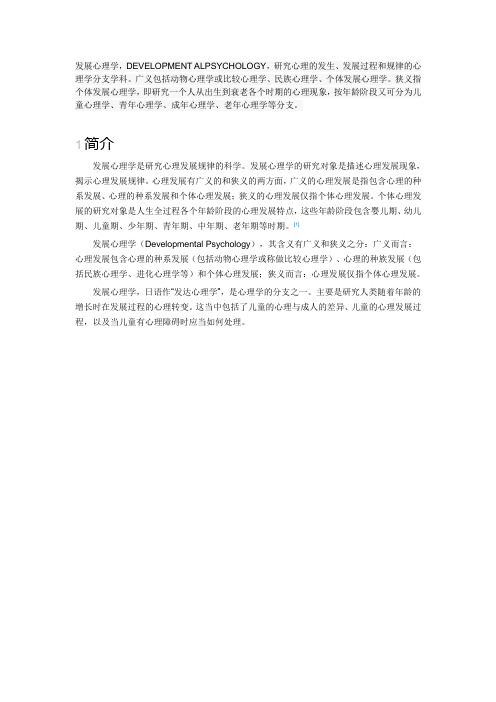进化心理学_心理科学的未来发展_英文_
精神分析主流五大学派

精神分析主流五大学派写此文的目的是用简洁的纲目做科普。
想把精神分析这个人人都知道的,神乎其神的概念简洁条理化,特别是经常用的精神分析五大学派,让大家对它有一个明晰的认知。
因为一百年来精神分析的人物众多,学界说法也多,我又是个粗线条的人,所以定会挂一漏万。
我们先把精神分析五个主要学派列出来。
一.弗洛伊德的经典精神分析-classical psychoanalysis二.沙利文,埃里克森等的自我心理学-Egopsychology三.克莱茵和费尔贝恩的客体关系-object-relations theory四.科胡特的自体心理学- Self Psychology五. Stolorow和Atwood的主体间性心理治疗-The intersubjectivity psychotherapy这五个学派也被统称为心理动力学。
后四个称为现代精神分析。
精神分析好像是说种庄稼的事,人就是一粒种子,自我心理学讲得是种子本身的生命本能,如发芽成长(好像人成长)的本能。
客体关系讲的是种子成长的土壤和环境问题,比如土好不好,有营养还是有害的土壤,阳光如何。
自体心理学说的是种子在土壤和环境中,被影响的成长问题。
而最新的主体间性治疗理论却全面阐述了以上的问题,它是精神分析过去四个学派的概括总结,它可能意味着精神分析理论的大结局。
一、弗洛伊德SigmundFreud,1856~1939,奥地利犹太人,约在1897年开始创立了精神分析这个理论,1902 年发展成心理分析学。
他的学生阿德勒、荣格等发展了它,后又与他分道扬镳,现在它被称为经典精神分析。
他是精神病医师,维也纳大学医学院医学博士。
主要著作有《梦的解析》,《日常生活的精神病理学》,《精神分析引论》,《图腾与禁忌》,《精神分析引论新编》等。
理论贡献:1.对人类潜意识心理过程的揭示2.人格结构理论:a,本我-性欲望驱动,按照快乐原则行动。
b,自我-社会经验积累的理性或正确的判断,它按照现实原则行动。
所有学科心理学单词

所有学科心理学单词心理学是研究人类心理和行为的学科。
以下是一些常见的学科心理学词汇:1. 认知(Cognition):指人类思维和知觉的能力。
认知(Cognition):指人类思维和知觉的能力。
2. 感知(Perception):指通过感官获得信息和对外界事物做出反应的过程。
感知(Perception):指通过感官获得信息和对外界事物做出反应的过程。
3. 记忆(Memory):指人类存储和提取信息的能力。
记忆(Memory):指人类存储和提取信息的能力。
4. 研究(Learning):指通过经验和实践改变行为的过程。
学习(Learning):指通过经验和实践改变行为的过程。
5. 发展心理学(Developmental Psychology):研究人类在不同年龄阶段的心理和行为变化。
发展心理学(Developmental Psychology):研究人类在不同年龄阶段的心理和行为变化。
6. 社会心理学(Social Psychology):研究人类社会交往、群体行为、态度和信念等方面的心理学分支。
社会心理学(Social Psychology):研究人类社会交往、群体行为、态度和信念等方面的心理学分支。
7. 人格心理学(Personality Psychology):研究人类个体差异和个性特征形成的心理学领域。
人格心理学(Personality Psychology):研究人类个体差异和个性特征形成的心理学领域。
8. 临床心理学(Clinical Psychology):应用心理学原理和方法来诊断和治疗心理问题和疾病的学科。
临床心理学(Clinical Psychology):应用心理学原理和方法来诊断和治疗心理问题和疾病的学科。
9. 社会认知(Social Cognition):指人类对社会信息的感知、加工和解释。
社会认知(Social Cognition):指人类对社会信息的感知、加工和解释。
最新Chapter 1 - The Evolution of Psychology:1章:进化心理学

Humanism: Carl Rogers and Abraham Maslow
Humanism is a theoretical orientation that emphasizes the unique qualities of humans, especially their freedom and potential for growth.
Sexual Urges play a large role
Behaviorism and B.F Skinner
All behavior is governed by external stimuli Fundamental Principle: organisms tend to repeat
responses that lead to positive outcomes and tend not to repeat responses that lead to neutral or negative outcomes Actions are the results of unconscious decisions Free will is an Illusion
Wilhelm Wundt (1879) Established Psychology as its own field 54,000 pages of books “Father” or “Founder” of Psychology
Consciousness
Developed by Wundt Developing the idea of consciousness “Awareness of immediate experience.”
Freud and the Unconscious
进化心理学 英文课件 Teaching_Evolutionary_Psychology

Milestones in the Origins of Modern Humans
Teaching Tool #2
• Teach students that there are multiple levels of causation and explanation.
Turtles
Teaching Tool #3
Sexual Selection Components
• Intrasexual Competition
Teaching Tool #6
• Explain the core tenets of evolutionary psychology
Core Tenets of Evolutionary Psychology
• Explain the three theories of the origins of complex adaptive mechanisms
1. Creationism
2. Seeding theory
3. Evolution by natural selection
Teaching Tool #4
– Migrated from Africa to Asia (1.8 MYA)
Increases in brain size during evolution
ardipithecus
brain size: 300 ccs
Australopithe- homo
cus
habilis
brain size: 310-530 ccs
• United all species into one grand tree of descent: including humans
进化心理学英文版

进化心理学英文版以下是《进化心理学》英文版的部分内容:Evolutionary psychology is a subfield of psychology that applies Darwinian natural selection principles to explain the psychological mechanisms and behaviors of humans and other animals. It posits that natural selection has shaped the psychological mechanisms of individuals to solve adaptive problems that have been recurrent in our species' evolutionary history.The field is interdisciplinary, drawing on concepts and methods from other fields such as biology, anthropology, sociology, and cognitive science. Evolutionary psychologists seek to understand how natural selection has shaped the design of the mind and behavior, and how these designs have been shaped by the environment in which they evolved.Evolutionary psychology has been controversial in the field of psychology, with some critics arguing that it is reductionistic or essentialist, or that it overemphasizes adaptationist explanations forbehavior. Others have raised concerns about the application of evolutionary psychology to the study of human social behavior, such as gender roles and sexual orientation, which have led to charges of biological determinism and social conservatism.请注意,这只是《进化心理学》英文版的一个简短概述,如果您想了解更多详细信息,建议直接阅读原版书籍。
心理学优秀书籍推荐

《变态心理学》(第 9 பைடு நூலகம்)
作者:(美)劳伦·B. 阿洛伊,(美)约翰·H.雷斯金德,(美)玛格丽特·J.玛诺斯著 译者:汤震宇,邱鹤飞,杨茜等 丛书名:德瑞姆·国家职业心理咨询师丛书 出版社:上海社会科学院出版社 ISBN:9787806816925 出版时间:2005-7-1 版次:1 页数:880 字数:1000000 纸张:胶版纸 包装:平装 开本:16 定价:86 元(现在购买仅 68.10 元) 简介: 本书是变态心理学研究领域的经典著作。美国 300 多所大学/学院均采用本书作为教材,包 括杜克、密歇根、霍普金斯等大学的心理学系。
心理学优秀书籍推荐
更多信息欢迎访问 阿才吧 /acaibar
Book list: 《心理学与生活》 《心理学的故事》 《实验心理学》 《社会心理学》 《变态心理学》 《与众不同的心理学》 《进化心理学——心理的新科学》 《改变心理学的 40 项研究》 《心理学导论》
《 心 理 学 与 生 活 》(psychology and life)
时就相对随便一些。正因如此,进化心理学使人类的行为变得十分易于理解:人的行为不仅 仅受某个具体环境的影响,而且还受到石器时代以来人类心理因素的引发,那么人类的性行 为的差异性,也受到这些因素制约。
进化心理学 Evolutionary Psychology

9/13/02
2:01 PM
Page 1
CHAPTER 1
Evolutionary Psychology
RUSSIL DURRANT AND BRUCE J. ELLIS
LEVELS OF EXPLANATION IN EVOLUTIONARY PSYCHOLOGY 2 THE METATHEORY LEVEL OF ANALYSIS 3 METATHEORETICAL ASSUMPTIONS THAT ARE CONSENSUALLY HELD BY EVOLUTIONARY SCIENTISTS 3 Natural Selection 4 Adaptation 4 Sexual Selection 6 Inclusive Fitness Theory 7 SPECIAL METATHEORETICAL ASSUMPTIONS OF EVOLUTIONARY PSYCHOLOGY 7 Psychological Mechanisms as the Main Unit of Analysis 8
Evolutionary psychology is the application of the principles and knowledge of evolutionary biology to psychological theory and research. Its central assumption is that the human brain is comprised of a large number of specialized mechanisms that were shaped by natural selection over vast periods of time to solve the recurrent information-processing problems faced by our ancestors (Symons, 1995). These problems include such things as choosing which foods to eat, negotiating social hierarchies, dividing investment among offspring, and selecting mates. The field of evolutionary psychology focuses on identifying these information-processing problems, developing models of the brain-mind mechanisms that may have evolved to solve them, and testing these models in research (Buss, 1995; Tooby & Cosmides, 1992). The field of evolutionary psychology has emerged dramatically over the last 15 years, as indicated by exponential growth in the number of empirical and theoretical articles in the area (Table 1.1). These articles extend into all branches of psychology—from cognitive psychology (e.g., Cosmides, 1989; Shepard, 1992) to developmental psychology (e.g., Ellis, McFadyen-Ketchum, Dodge, Pettit, & Bates, 1999; Weisfeld, 1999), abnormal psychology (e.g., Mealey, 1995;
发展心理学

发展心理学,DEVELOPMENT ALPSYCHOLOGY,研究心理的发生、发展过程和规律的心理学分支学科。
广义包括动物心理学或比较心理学、民族心理学、个体发展心理学。
狭义指个体发展心理学,即研究一个人从出生到衰老各个时期的心理现象,按年龄阶段又可分为儿童心理学、青年心理学、成年心理学、老年心理学等分支。
1简介
发展心理学是研究心理发展规律的科学。
发展心理学的研究对象是描述心理发展现象,揭示心理发展规律。
心理发展有广义的和狭义的两方面,广义的心理发展是指包含心理的种系发展、心理的种系发展和个体心理发展;狭义的心理发展仅指个体心理发展。
个体心理发展的研究对象是人生全过程各个年龄阶段的心理发展特点,这些年龄阶段包含婴儿期、幼儿期、儿童期、少年期、青年期、中年期、老年期等时期。
[1]
发展心理学(Developmental Psychology),其含义有广义和狭义之分:广义而言:心理发展包含心理的种系发展(包括动物心理学或称做比较心理学)、心理的种族发展(包括民族心理学、进化心理学等)和个体心理发展;狭义而言:心理发展仅指个体心理发展。
发展心理学,日语作“发达心理学”,是心理学的分支之一。
主要是研究人类随着年龄的增长时在发展过程的心理转变。
这当中包括了儿童的心理与成人的差异、儿童的心理发展过程,以及当儿童有心理障碍时应当如何处理。
- 1、下载文档前请自行甄别文档内容的完整性,平台不提供额外的编辑、内容补充、找答案等附加服务。
- 2、"仅部分预览"的文档,不可在线预览部分如存在完整性等问题,可反馈申请退款(可完整预览的文档不适用该条件!)。
- 3、如文档侵犯您的权益,请联系客服反馈,我们会尽快为您处理(人工客服工作时间:9:00-18:30)。
心 理 学 报 2007,39(3):381~382 Acta Psychologica Sinica381The Future of Psychology: Evolutionary Approach to Scientific PsychologyLei ChangDepartment of Educational Psychlogy, The Chinese University of Hong KongDavid C. GearyUniversity of Missouri at Columbia, USA“Evolutionary psychology is an approach to psychology, in which knowledge and principles from evolutionary biology are put to use in research on the structure of the human mind” (Cosmides & Tooby, 2001, p.1). The approach can be used to study and to provide broad theoretical framing of nearly all of the issues and topics within the traditionally defined fields of psychology. The 19 papers included in this special issue on evolutionary psychology are written by leading scholars in the field and address topics that can be organized by the familiar divisions of cognitive, developmental, and social psychology.Evolutionary cognitive psychology . The author of The origin of mind (Geary, 2005), David Geary leads the discussion on evolutionary cognitive psychology. His paper lays out the foundations and principles for understanding the brain and its cognitive and behavioral systems. Differing from the all-purpose general cognitive model, an evolutionary account of human cognition, as the paper asserts, emphasizes individual and specialized cognitive processing modules that have been naturally selected for solving recurring environmental and social problems. Geary provides detailed accounts of some of the familiar modules known in mainstream psychology as folk physics, folk biology, and folk psychology, and outlines how domain-general systems (e.g., working memory) may have evolved. Four other papers presented under this section are from Gary Brase,Wang Xiao-tian, Michael Corballis, and Steven Pinker. Gary Brase investigated the rather classical cognitive topic of Bayesian reasoning. Consistent with evolutionary theorizing, his empirical findings suggest that recurrence of the format and context in which a problem is presented improves human statistical reasoning. Wang’s empirical paper shows that risk taking behavior and decision making carry evolutionary footprints that can be inferred by investigating such variables as genders of parents and children and relative versus absolute family wealth. Michael Corballis and Steven Pinker are leadingReceived 2006-12-16Correspondence should be addressed to Lei Chang, Department of Educational Psychology, Chinese University of Hong Kong, Shatin, New Territories, Hong Kong; e-mail: leichang@.hk.authorities on language evolution. Emphasizing different issues (e.g., language instinct, to use the name of the author’s classic book (Pinker, 1994) and, for Corballis, language modality evolution or the transition “from hands to mouth” to borrow from his book title (Corballis, 2002), these two papers together provide a state of the art account of language evolution.Evolutionary developmental psychology . As the author of the first evolutionary developmental psychology text (Bjorklund & Pellegrini, 2002), David Bjorklund co-authored with Jason Grotuss, and Adriana Csinady to discuss life history tradeoffs concerning child and adolescent development. Why do humans have one of the longest childhoods in the natural world, and how does child development make use of cognitive plasticity within the beneficial adaptive constraints described by articles in the first section? As shown in this lead paper of the section, some of the answers are beyond simple combinations of evolutionary life history theories and those of mainstream developmental psychology. One of the answers has been provided by the next article by Jay Belsky, who is known for his seminal work on how early childhood experience may prompt the onset of biological clock by stimulating different reproductive strategies (Belsky, Steinberg, & Draper, 1991). In his current contribution, Belsky re-examines his theory by presenting existing empirical studies testing and extending his original work. The next three empirical studies (Byrd-Craven, Geary, Vigil, & Hoard; Brumbach, Walsh, & Figueredo; Frederick & Gallup, Jr.) provide additional evidence for these evolutionary developmental principles. Byrd-Graven et al. investigated the relation between developmental experience and later relationship preferences. Brumbach et al. examined adolescents’ sexual attitudes and behaviors in a large sample of 13,000 participants. Examining dental fluctuating asymmetry among 296 individuals of 10 species, Frederick and Gallup, Jr. concluded that the tradeoff between brain and motor development may have lessened selection pressure for developmental symmetry in humans relative to other primates. To conclude this section, Li and Chang made the distinction between parent-child382心 理 学 报 39卷resemblance belief and actual parent-child resemblance and found that parental belief about father-child resemblance affected paternal investment by moderating the associations between paternal parenting behavior and paternal versus child characteristics.Evolutionary social psychology examines mating and sexual relationships as a major research topic. Six articles are devoted to this topic, with the lead article by David Buss delineating and testing his Sexual Strategy Theory (SST, also see Buss, 1994). One of the pioneering theories of evolutionary psychology, SST has since spawned a large number of empirical studies across diverse cultural contexts. All the articles in this section are related to this theory in one way or another. Surbey and Brice examined the effectof self perceived mate value (SPMV), which was experimentally manipulated, on mating strategy differences between men and women. Consistent with SST, their results showed that, with enhanced SPMV, men preferred short term mating strategies, whereas the same effect was not found among women. The empirical findings of Starratt, Shackelford, Goetz, and McKibbin demonstrate how infidelity signals could change men’s long term mate retention behavior. Norman Li investigated mating strategies of both men and women. Extending SST, Li’s theory and findings suggest that people behave in ways consistent with microeconomic principles when the costs and benefitsin making mate choices are weighed. The empirical work by Graver-Apga, Gangestad, and Thornhill is about the effect of menstrual cycle on mating preferences, suggesting that women in the most fertile phase of their cycle were more vigilant about sexual coercion.In addition to these articles, the special issue also includes three conceptual papers bearing on broader issues of evolutionary psychology. They are Why evolutionary psychology? by Irwin Silverman; Reconciling evolutionary psychology and ecological psychology by Geoffrey Miller; and, Some of the whats, whos, and whens related to evolutionary psychology by Chang Lei. The former editor of the North American journal, Evolutionary Psychology, Irwin Silverman presents a succinct introduction to evolutionary psychology in which he explains how psychologists may overcome the conceptual weaknesses of the standard social science model by addressing the “why” questions of causation. Geofferey Miller takes a different approach by drawing comparisons between evolutionary psychology and ecological psychology. Incidentally, this paper by the author of the Mating mind (2002) also shows that evolutionary psychology is not all about sex. The final article introduces concepts and theories related to evolution and evolutionary psychology. Extended treatment of these and other topics are contained in an upcoming book in Chinese (Chang, 2007).To conclude this brief introduction of the special issue on evolutionary psychology, we want to use the following quotation to express our hope that the special issue makes a timely contribution to the rapid development of Chinese psychology. “Of all the factsof life, the most important is evolution. If psychologyis to take its legitimate place among the family of life sciences, it must eventually integrate its basic theories and facts with those of evolution.” (Rosenthal, 1970, p.1).ReferencesBelsky, J., Steinberg, L., & Draper, P. (1991). Childhood experience, interpersonal development, and reproductive strategy. Child Development, 62, 647-670.Bjorklund, D. F., & Pellegrini, A. D. (2002). The origins of human nature: Evolutionary developmental psychology. Washington, DC: American Psychological Association.Buss, D. M. (1994). The evolution of desire: Strategies of human mating. New York: Basic Books.Chang, L. (2007). Evolutionary psychology. Guangdong Higher Education Press. (in Chinese)Corballis, M. C. (2002). From hand to mouth: The gestural origins of language. Princeton, NJ: Princeton University Press.Cosmides, L., & Tooby, J. (2001). Evolutionary psychology: A primer. Center for Evolutionary Psychology Online Reading: /research/cep/primer.html.Geary, D. C. (2005). The origin of mind: Evolution of brain, cognition, and general intelligence. Washington, DC: American Psychological Association.Miller, G. F. (2000). The mating mind: How sexual choice shaped the evolution of human nature. New York: Doubleday.Pinker, S. (1994). The language instinct. New York: Harper-Collins. Rosenthal, D. (1970). Genetic theory and abnormal behavior. New York: McGraw-Hill.。
